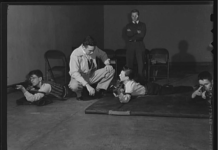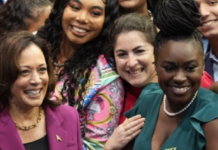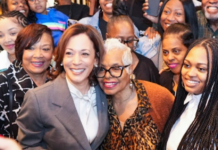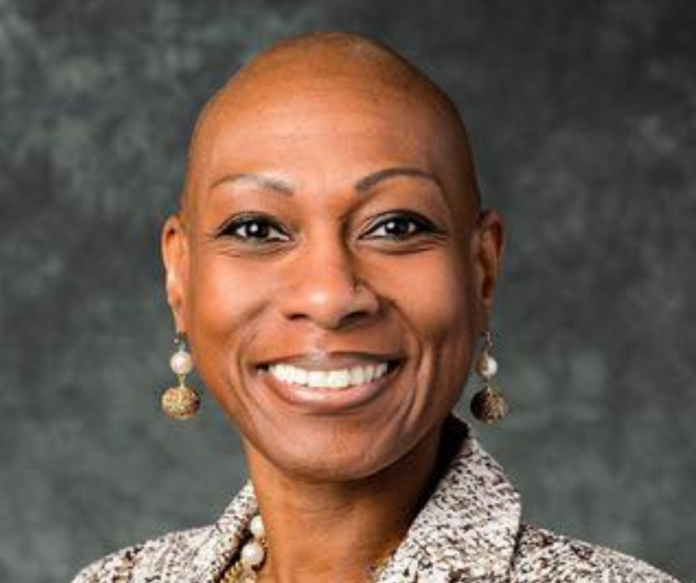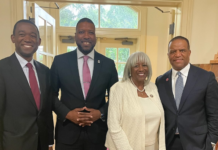By Nadra Nittle/Originally published by The 19th
Some of the Lincoln University community members protesting for Antoinette “Bonnie” Candia-Bailey were close to her. Others didn’t know her well — or at all. What those who turned out for this week’s “call to action” have in common, they say, is that her story compelled them to act.
Candia-Bailey, a school administrator who was widely known on campus as “Dr. Bonnie,” took her life January 8 at age 49 after she was reportedly fired from the historically Black college in Jefferson City, Missouri. She left behind emails — provided to The 19th and other news outlets — alleging that Lincoln University President John Moseley bullied her, pushing her out of her job after she asked to go on leave for “severe depression and anxiety.”
“Lincoln is where it started for me and where it ended,” Candia-Bailey, a 1998 LU alum, wrote in a letter to Moseley. In May, she returned to the university as vice president of student affairs.
In a statement to The 19th, Lincoln University’s Board of Curators, its governing body, said that it continues to mourn her “tragic loss.” The board said that it is using an independent third-party expert to review the concerns raised in the wake of her death. In the meantime, the statement continued, the university is taking steps to prioritize the mental health of its employees and students.
“The board has ensured full open access to personnel, documents and other relevant information as part of this review, which we are confident will fully examine important questions and concerns and gather facts so that we can make the best decisions for our students, faculty and staff and the entire university community,” the statement said.
Candia-Bailey’s suicide has started dialogues about mental health in the workplace and particularly the pressures that Black women working in higher education face. Her passing has also opened up Lincoln University to criticism by students and alums who say that the HBCU has in recent years undergone cultural shifts that have made them feel alienated on the campus they once considered a home.
The alumni association said they organized the call to action, which kicked off Thursday with a rally at the state capitol, because they want their alma mater to be a nurturing environment for all community members and to “stand against workplace bullying, harassment and neglect of mental health.” They also want to see systemic change at Lincoln, transparency from school officials and those who allegedly ignored Candia-Bailey’s appeals for help to face consequences.
Alexis Anginette Wells, a 2014 alum who has promoted the call to action organized by the alumni association, which includes a dialogue and activities through the weekend, said that it is important that activism for Candia-Bailey takes place because the administrator was not alone. Other members of the Lincoln community have also experienced mental illness, Wells said.
“We want her story to continue to be shared,” she said. “We want the university as well as the Jefferson City community to know that we stand with the students on removal of all the individuals involved in the situation, and we won’t be silenced.”
The calls that began in January for Moseley to resign or be terminated have not quieted down, and some Candia-Bailey supporters are also seeking the departures of other school officials they believe contributed to her mental health crisis. Most did not name names but pointed out that the late administrator had unsuccessfully requested that the Board of Curators intervene as her fears for her job and emotional distress intensified.
Students and alums alike have used the hashtags #firemoseley and #JusticeforBonnie on social media to draw attention to Candia-Bailey’s plight. Since her death, Lincoln community members have gathered on multiple occasions, especially during Board of Curators meetings. They say they don’t plan to stop after the call to action, which has already produced results, according to Sherman Bonds, president of the Lincoln University Alumni Association.
On Thursday, the group met with state lawmakers, including members of the Legislative Black Caucus. Alums also spoke with the Board of Curators, Bonds said.
“We have really voiced our concerns,” he said. “We believe that we have made some inroads about future engagements with the legislative body. That’s pretty much where we are. So we have to take that and build on it. They had some things they want us to do, some things that we need to look for as an association, so we take that and that’s what we work with.”
The alumni association ended their Thursday activities with a dedication to Candia-Bailey that included hanging her picture in Lincoln University’s Memorial Hall and crafting a resolution in her honor.
While Bonds considers Thursday’s events positive developments, he said that his group would still like to see the president leave his post. Moseley has been on leave since January as an investigation into Candia-Bailey’s claims takes place. He is White and joined the university in 2022, a century after the last White president led Lincoln, which today has nearly equal percentages of Black and White students.
But Falon Ensley, a Lincoln University senior and former Student Government Association (SGA) president, stressed that race is not motivating her and other Candia-Bailey supporters to demand that the president step down.
“This is not about Black and White,” Ensley said. “I want to make this very clear. Just because we have a White university president and this happened to a Black woman, this is not about race, because this could have happened to anybody. This could be your sister, this could be your mother. This is about mental health and how it needs to be taken serious, and it should never be neglected.”
But Ensley acknowledged that her HBCU has undergone shifts leading up to Candia-Bailey’s firing and death. Multiple alums have exited jobs at the HBCU, she said. Reading the late administrator’s emails has given students clarity about what they characterize as a personnel turnover and changing direction at the school.
“We kind of knew there was a cultural change that was going on, but we didn’t understand where it was coming from or why it was happening,” said Kenlyn Washington, a Lincoln University senior and current SGA president. After they read Candia-Bailey’s emails, “everything kind of started to make sense,” Washington continued. “We want to move forward and make sure that we hold everyone accountable so this doesn’t happen again. We don’t want to go through the same heartbreak.”
Ensley said students do not feel safe and do not trust those in power at the university anymore. She added that even faculty members have told her that they’re afraid to express their concerns publicly for fear of retaliation.
“So it’s like everybody’s walking on eggshells right now,” Ensley said.
Washington does not want Black women to push themselves to the limit and said their bullying in higher education and other spaces is a conversation that’s overdue in the Black community.
“We have to realize mental health is a real thing,” she said. “As much as we as humans try to fight it to say, ‘Oh, I’m OK, I’m fine,’ sometimes we do need to just calm down and say, ‘I need help.’”
Angela Neal-Barnett, a professor in Kent State University’s Department of Psychological Sciences and director of its Program for Research on Anxiety Disorders among African Americans, said that Black women in higher education should not be stigmatized when their mental health suffers. Candia-Bailey should have gotten the help she needed, Neal-Barnett said.
“According to the reports, rather than help, she was stigmatized and treated as if somehow she was not fit for the position that she had,” she said. “We have to destigmatize mental health. We have to say it’s OK not to be a strong Black woman and to take time for yourself for you to heal, and we cannot penalize people because they … are doing the things that they need to heal. If she had cancer, if she needed surgery, I suspect she would have been treated very differently.”
That Candia-Bailey felt bullied in a job that she loved, one that she returned to her alma mater to perform, is particularly upsetting, Washington said. Now, some students and alums feel that Lincoln University wants to quickly move on from her death. They’ve accused the school of removing fliers with her picture and information about activism on her behalf.
“We’re showing up so that they know that this is not acceptable, and we don’t approve of all the actions that are happening at the university that we once attended,” Wells said.
Candia-Bailey served in multiple roles at several institutions during her 24-year career in higher education, according to the Journal of Blacks in Higher Education. Her positions included Title IX coordinator at Elms College, associate dean of students and senior project coordinator at the University of Wisconsin-Madison and director of academic excellence at North Carolina A&T State University.
Although Candia-Bailey died by suicide, Washington and Wells do not remember her as a tragic figure. Washington admired that she was an alum and the enthusiasm she had for students, staff and the faculty at the university.
“Just having a conversation with her goes a long way just to understand who she was as a person,” Washington said. “She only came back because she loved what she did and she wanted to make LU better, and it’s sad that her coming back for her love of the university tragically made her take her life. I feel like that sentence speaks volumes to say that one of our alumni came back to help us and ultimately, it just didn’t work out for her due to the leadership that she was under.”
Wells met the late administrator about nine years ago. They were both members of the Alpha Kappa Alpha (AKA) sorority of which Vice President Kamala Harris is also a member. As Wells’ “big sister” in the Lincoln University chapter of AKA, Candia-Bailey bonded with her over the years, she said.
“When I would see her, I would always call her Soror Bonnie,” Wells said. “I wouldn’t really call her doctor. That’s because I knew her on a different level. One thing about her — she was an organizer, community leader. She focused on women’s empowerment. She was very, very helpful and a bright personality. It’s just really sad that the system failed her after she reached out for help.”
If you or someone else needs mental health support, contact 988lifeline.org or the 988 Suicide & Crisis Lifeline available 24/7.

